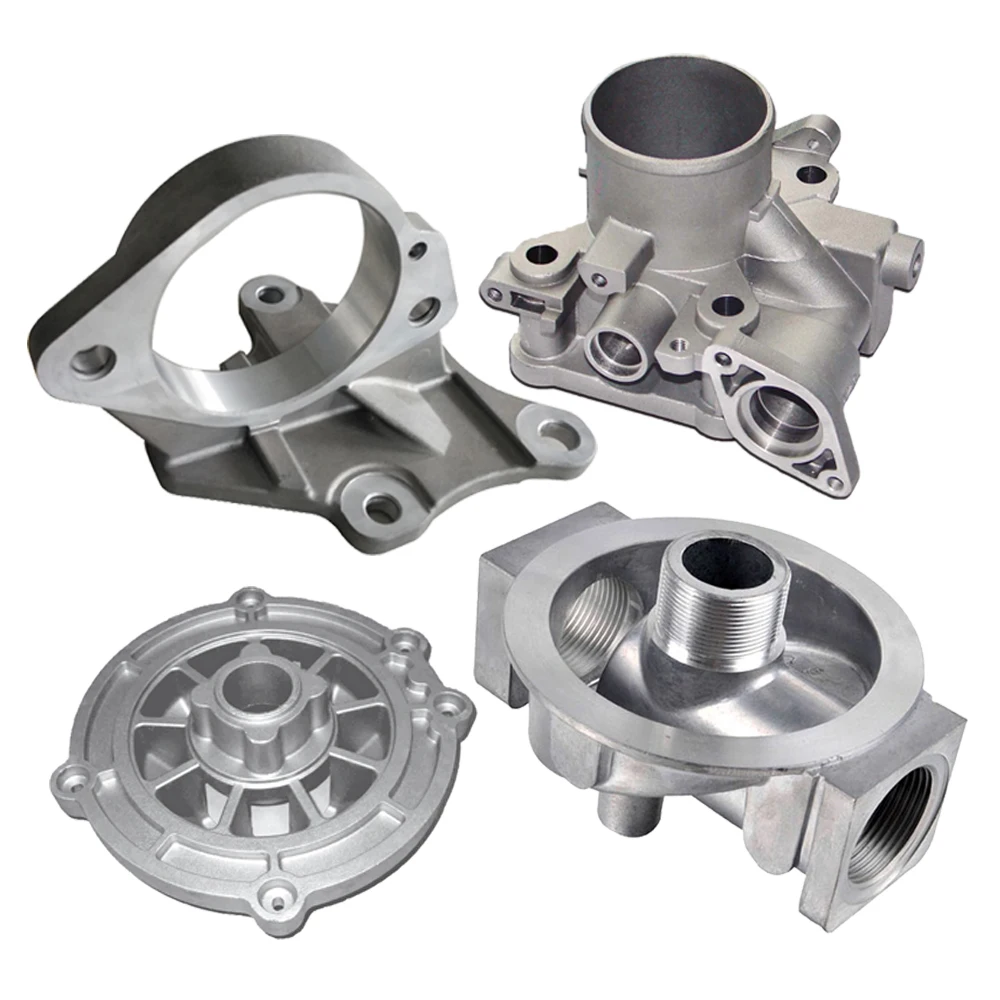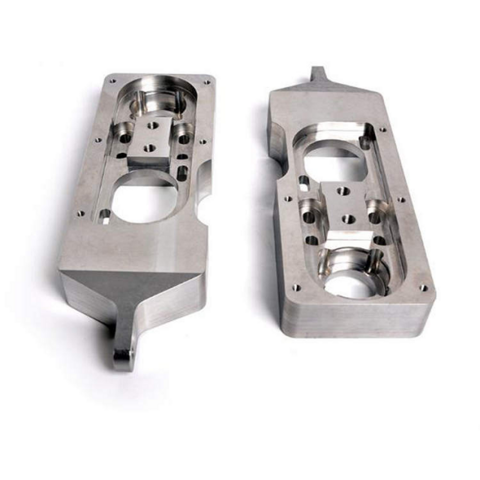Explore the benefits of custom Precision aluminum casting for your next project
How Aluminum Casting Adds to Effective Production Solutions
Aluminum spreading plays an important duty in modern-day manufacturing. Its lightweight nature and rust resistance make it a preferred option for numerous sectors. Techniques such as die spreading and sand spreading enable the development of elaborate get rid of minimal waste. The integration of automation additional boosts manufacturing efficiency. The ramifications of these innovations extend beyond mere productivity - aluminum casting. Recognizing the broader impact reveals significant insights right into the future of manufacturing
The Benefits of Light Weight Aluminum in Production
Different steels are used in manufacturing, light weight aluminum stands out due to its one-of-a-kind buildings that improve production efficiency and item efficiency. Its lightweight nature especially reduces transport expenses and energy requirements in numerous applications. Light weight aluminum's exceptional deterioration resistance warranties long life and durability, minimizing the demand for regular replacements and upkeep. This metal can be easily built and shaped, enabling for versatile design options that satisfy particular industry requirements. Additionally, light weight aluminum displays superior thermal and electric conductivity, making it a perfect choice for applications needing efficient warmth dissipation and electrical monitoring. The recyclability of aluminum likewise plays a crucial function in lasting manufacturing techniques, as it can be reused without shedding its fundamental homes. On the whole, the advantages of light weight aluminum in manufacturing lead to set you back savings, boosted item durability, and a lowered ecological footprint, making it a favored material in numerous industries.
Trick Light Weight Aluminum Spreading Techniques
Light weight aluminum spreading strategies are crucial for creating top quality elements in numerous manufacturing processes. The main approaches consist of sand casting, die casting, and financial investment spreading. Sand casting includes developing a mold from sand, which permits intricate forms and large elements. This strategy is often favored for its cost-effectiveness and adaptability. Pass away spreading, on the various other hand, utilizes high-pressure to inject molten aluminum into steel molds, leading to exact, consistent components ideal for high-volume manufacturing. Financial investment spreading supplies superior surface finish and intricate detail by utilizing a wax pattern that is disappeared to develop the mold and mildew. Each of these methods has certain applications and benefits, enabling makers to select the most appropriate method based on factors like manufacturing intricacy, volume, and material specs. By comprehending these vital methods, makers can improve their manufacturing effectiveness and assure the honesty of their aluminum elements.
Effect on Automotive Industry
As the vehicle industry increasingly prioritizes lightweight materials to improve fuel effectiveness and performance, light weight aluminum casting has emerged as an essential option. This production procedure allows automakers to create intricate parts with decreased weight without jeopardizing structural integrity. By utilizing aluminum spreading, producers can develop components such as engine blocks, transmission real estates, and suspension parts that are not just lighter however additionally show excellent thermal conductivity and corrosion resistance.
The flexibility of aluminum casting techniques enables the manufacturing of elaborate styles, helping with technology in lorry appearances and performance. As automobiles end up being much more technically advanced, the ability to integrate attributes like innovative safety and security systems and electrical drivetrains ends up being essential.

Aerospace Applications of Light Weight Aluminum Spreading
Light weight aluminum casting plays a crucial role in aerospace applications by enabling the manufacturing of light-weight structural components that improve fuel effectiveness. Additionally, the precision of aluminum casting permits the development of elaborate engine components, which are necessary for peak efficiency and dependability. This combination of lightweight products and precise design placements aluminum spreading as an essential innovation in the aerospace market.
Lightweight Structural Components
In the quest for improved efficiency and efficiency in aerospace applications, light-weight structural components have come to be significantly important. Aluminum spreading plays a pivotal function in this venture, giving makers with the ability to create components that are both light-weight and strong. The low density of aluminum enables for substantial weight reductions without compromising structural integrity, which is vital for aircraft performance and gas performance. On top of that, aluminum castings can be engineered to fulfill particular design demands, allowing the creation of intricate geometries that standard manufacturing methods may struggle to accomplish. This flexibility not only enhances manufacturing procedures yet likewise adds to general price savings. As the aerospace sector remains to highlight sustainability, the demand for light-weight aluminum elements is expected to increase, further advancing technology in production.
Precision Engine Parts
Producers increasingly depend on aluminum spreading to generate precision engine parts for aerospace applications, driven by the product's one-of-a-kind properties. Aluminum's light-weight nature considerably lowers general aircraft weight, improving gas effectiveness and efficiency. Its superb corrosion resistance assurances durability in rough settings, making it excellent for crucial engine components. Additionally, aluminum casting permits elaborate styles and tight resistances, essential for optimizing engine performance and integrity. The spreading procedure additionally sustains automation, allowing makers to fulfill high need while preserving high quality requirements. As aerospace technology remains to advance, the role of light weight aluminum spreading in producing precision engine components will certainly be essential in accomplishing greater performance and technology in airplane style and functionality.
Sustainability and Environmental Advantages
The growing emphasis on sustainability in production has positioned light weight aluminum spreading as a leading service for environmentally aware manufacturing. This process makes use of recycled light weight aluminum, which considerably reduces power consumption contrasted to main aluminum manufacturing. By leveraging scrap metal, suppliers can reduce their carbon footprint and decrease waste, lining up with international sustainability objectives.
In addition, aluminum casting generates fewer harmful discharges, adding to a cleaner environment. The light-weight nature of aluminum likewise enhances gas efficiency in transport applications, further advertising green methods.
Moreover, the toughness and rust resistance of light weight aluminum lead to longer product life-spans, minimizing the demand for frequent substitutes and conserving resources. As markets significantly prioritize sustainable options, light weight aluminum spreading attracts attention as an innovative technique that not just meets manufacturing needs yet additionally supports environmental stewardship. This dedication to sustainability positions aluminum casting as a critical player in the shift in the direction of a greener production landscape.
Price Performance in Production
Expense effectiveness is a significant advantage of light weight aluminum spreading, enhancing its sustainability advantages - Precision aluminum casting. The process of aluminum spreading enables the production of intricate forms with very little waste, which is especially crucial in an affordable production atmosphere. Using aluminum decreases energy prices, as it has a lower melting factor compared to various other metals, causing reduced power usage throughout production
Additionally, aluminum's light-weight homes contribute to lower delivery and dealing with costs, better boosting total cost efficiency. The resilience and corrosion resistance of light weight aluminum actors products also suggest that they need much less maintenance and replacement with time, causing lasting cost savings for makers.
Additionally, improvements in casting innovations, such as boosted mold and mildew designs and automation, have structured production procedures, minimizing labor find this expenses and raising outcome efficiency. Generally, cost effectiveness in aluminum casting plays an essential duty in optimizing manufacturing operations and sustaining competitive prices approaches.
Future Patterns in Light Weight Aluminum Spreading
The future of light weight aluminum spreading is increasingly formed by advancements in automation and lasting product developments. Automation modern technologies are expected to improve performance and accuracy in the spreading procedure, while lasting techniques aim to minimize ecological effect. With each other, these fads promise to redefine production criteria and techniques within the light weight aluminum spreading sector.
Automation in Aluminum Casting
Welcoming automation is changing aluminum casting processes, paving the method for improved performance and accuracy. Automated systems streamline production by Continued reducing human treatment, minimizing mistakes, and raising throughput. Technologies such as robot arms and computer system mathematical control (CNC) machines enable accurate and consistent shaping of aluminum components. Additionally, smart sensing units monitor different criteria in genuine time, making certain perfect conditions throughout the casting process. This integration of automation not just reduces preparations however likewise improves product quality by keeping tighter resistances. As makers significantly embrace these sophisticated innovations, the aluminum spreading sector is readied to experience considerable improvements in operational performance, cost-effectiveness, and competition in the worldwide market.
Sustainable Product Innovations

Regularly Asked Concerns
What Types of Light Weight Aluminum Alloys Are Commonly Utilized in Spreading?
Commonly used aluminum alloys in casting consist of 356, 380, and 413. These alloys are preferred for their excellent fluidity, stamina, and rust resistance, making them suitable for a range of commercial applications.
Just How Does Light Weight Aluminum Casting Compare to Other Metal Spreading Approaches?
Aluminum casting generally provides lower weight, remarkable rust resistance, and far better thermal conductivity contrasted to various other steel spreading approaches. In addition, it permits for detailed layouts and faster manufacturing cycles, boosting total production performance and efficiency.
What Industries Advantage A Lot Of From Light Weight Aluminum Casting?
The automobile, aerospace, and electronics industries benefit most from light weight aluminum spreading. These fields use its light-weight, corrosion-resistant properties to enhance efficiency, minimize fuel consumption, and improve total item effectiveness, making aluminum spreading increasingly crucial.
Exist Certain Style Limitations With Aluminum Spreading?
Yes, light weight aluminum casting has design limitations, including constraints on wall surface density, complicated geometry difficulties, and potential issues with attaining limited tolerances (aluminum casting). These factors can influence the general strength and capability of the final item
Exactly How Is Quality Assurance Maintained in Light Weight Aluminum Casting Processes?
Quality assurance in aluminum spreading processes is kept with rigorous assessments, adherence to standardized procedures, and making use of sophisticated modern technologies. Regular tracking warranties dimensional accuracy, surface stability, and product uniformity throughout production, advertising overall integrity.
As the automotive market increasingly prioritizes light-weight materials to improve gas effectiveness and efficiency, aluminum casting has actually emerged as an important solution. Light weight aluminum spreading plays a crucial duty in aerospace applications by enabling the manufacturing of light-weight structural parts that enhance fuel effectiveness. Price performance is a considerable advantage of light weight aluminum spreading, complementing its sustainability benefits. Accepting automation is changing aluminum casting procedures, paving the method for boosted efficiency and precision. Recycled aluminum usage has actually obtained grip, considerably reducing energy consumption compared to main light weight aluminum manufacturing.